Samasta's Centennial: Marking Six Phases of Islamic Education in Kerala
When it comes to the status of Indian Muslims, they enjoy the liberty to uphold, follow, and propagate their religious doctrines, despite being a minority. Furthermore, they benefit from a multitude of well-established Islamic institutions and organizations actively engaged in a diverse range of programs. Of particular significance is the Samasta Kerala Jam'iyyat al-Ulama (S.K.J.U, commonly known as ‘Samasta’), which has played a pivotal role in guiding the majority of Kerala Muslims for the past century. It holds considerable importance in matters of Islamic education, Islamic jurisprudence and serves as a trusted source for fatwas and various other religious and social concerns. Commemorating its centenary, the organization is set to commence its anniversary celebrations on January 28th in Bangalore.
Established on June 26, 1926, Samasta is widely regarded as a respected religious authority in South India, recognized as a significant influence by both Muslims and non-Muslims. Notably, Samasta stands at the forefront, guiding the largest Muslim populace in South India and earning renown as the vanguard of Islamic education in Kerala.
As a cornerstone objective outlined in its constitution, Samasta has consistently prioritized the advancement of education, both Islamic and human sciences, in alignment with Islamic principles and identity. An in-depth look at Samasta's efforts shows that in its first twenty-five years, it concentrated on protecting genuine Islamic teachings from distortions spread by modern education and pseudo-spiritual movements. Later, it prioritized reinforcing Islamic education, recognizing knowledge as the cornerstone of any society and its identity.
Presently, Samasta's educational advance has culminated in a comprehensive framework spanning six distinct levels. This framework is designed to enrich students with a blend of Islamic teachings, human sciences, and professional courses. At the outset, the initial level comprises primary madarsas, followed by colleges of Islamic sciences at the second level. Progressing further, the third level encompasses colleges offering post-graduate studies in Islamic sciences. Following that, the fourth tier comprised colleges offering integrated education, blending revealed knowledge with human sciences through distinct currculams.
A major milestone for Samasta is the opening of its fifth tier, which includes material and professional colleges in an Islamic setting. The MEA Engineering College, for instance, aims to provide high-quality education to the community, producing skilled engineers with integrity and social responsibility.
The most recent advancement in this journey is the establishment of the Samastha National Educational Council (SNEC) in 2023. This forward-looking initiative is designed to cultivate professionals knowledgeable in both Islamic and secular subjects, encouraging a deeper integration of Islamic education and expertise.
Madrasah Movement
Beginning in 1945, Samasta shifted its emphasis towards educational empowerment, spearheading projects aimed at revitalizing publications, initiating a madrasah movement, establishing Islamic educational institutes, and forming diverse sub-committees to further its mission.
In 1951, Samasta sparked a significant change in the lives of Kerala Muslims by introducing a systematic and scientifically based religious education system. This pioneering approach sought to promote excellence in Islamic sciences while also staying advanced in harmony with Islamic principles. This system underwent regular and dynamic adaptations to meet the evolving needs of the times. Presently, Samasta administers a vast network comprising more than ten thousand seven hundred primary educational institutions, commonly referred to as madrasas. As of June 2021, these institutions educate 1,118,534 students. Supported by a dedicated faculty of 95,874 teachers, officially enlisted through the Mu’allim Service Register at the S.K.I.M.V.B office, these madrasas represent a formidable force in the realm of Islamic education, a golden feather in Samasta’s services.
Through its endeavors, Samasta has established a crucial educational pathway for Muslim students, with madrasah education forming the foundation for primary studies. This educational framework extends up to the 12th standard, with classes typically held early in the morning between 6-9 AM before the start of regular school hours, which usually commence by 10 AM.
Furthermore, as a testament to the Board’s impactful initiatives, individuals from select regions in Tamil Nadu, Karnataka, Lakshadweep, Maharashtra, Pondicherry, and the Andaman Nicobar Islands have adopted the Samasta madrasah curriculum, establishing madarasas in these areas. Additionally, Malayalam-speaking communities residing in Malaysia, UAE, Bahrain, Kuwait, Saudi Arabia, Qatar, and Oman have embraced the same curriculum and participate in Samasta's general examinations.
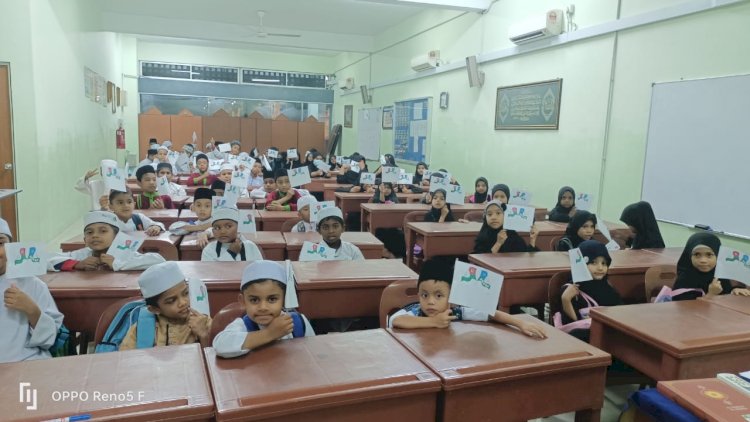
Samasta Madrasah in Johor, Malaysia, Madrasah Al-Irsyadiah (SKIMVB Reg No: 8822)
Dars and Islamic Colleges
Dars system in Kerala, India, refers to a traditional Islamic education system that has been prevalent in the region for centuries. Dars institutions are often associated with mosques and serve as centres for religious learning and the dissemination of Islamic teachings. In this system, students completely dedicate themselves to Islamic education under the tutelage of a Mudarris (teacher). They typically spend 6-10 years studying with their teacher to become experts in Islamic knowledge.
Following the successful implementation and widespread adoption of the madrasah system across Kerala and beyond, Samasta embarked on further advancing Islamic education by establishing Islamic Colleges. Among these pioneering institutions was Jamia Nooriyya Arabiyya, located in Pattikkad, Malappuram.
The establishment of this new college was spurred by several factors, including the difficulties faced in securing admission to esteemed institutions like al-Baqiyat al-Salihat in Vellore, Tamil Nadu, or Dar al-‘Ulum in Deoband, which were highly regarded for Islamic education at the time, circa 1960. These challenges included limited seats, language barriers, financial constraints, and geographical distance.
Jamia Nooriyya Arabiyya was established on August 8, 1963, initially operating within the premises of the Rahmaniyyah Masjid in Pattikkad, Malappuram. A year later, on November 12, 1964, it moved to a dedicated building at the same location. Serving as an advanced learning center, the college specifically accommodated students who had finished their undergraduate studies in other institutions, especially those from the dars system.
Aligned with the educational principles of Samasta, Jami’ah Nooriyah prioritizes the Shafi’i fiqh, providing extensive courses in Arabic language, tafsir (Qur'anic exegesis), prophetic traditions, and tasawwuf (Islamic mysticism), predominantly using classical Islamic texts.
Inspired by the example set by Jami’ah Nooriyah, several other Islamic colleges have emerged across different regions of Kerala, promoting advanced learning in Islamic sciences. Notable among these institutions are Rahmaniyyah Arabic College in Kadameri and Jami’ah Dar al-Salam in Nandi.
In recent years, there has been a trend where students spend some time in Dars and then continue their education in Islamic colleges. Upon completion of their studies, graduates of these colleges are often bestowed with various titles such as Faizy, Hudawi, Rahmani, Darimi, etc. Furthermore, numerous Arabic colleges serve as esteemed private centers for postgraduate studies in Islamic education, producing thousands of graduates annually.
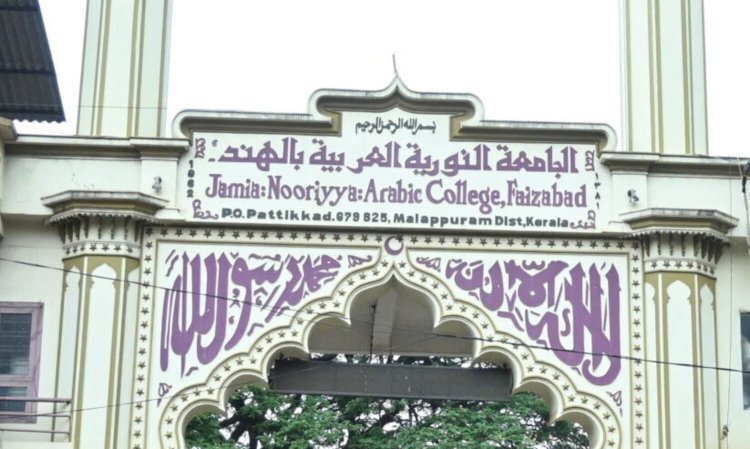
Jamia Nooriyya Arabiyya, Pattikkad, Malappuram, Kerala
Integrated Education
The establishment of Darul Huda Islamic University, DHIU, (formerly Darul Huda Islamic Academy) marked a significant advancement in Islamic education, creating an academic environment where Islamic religious teachings and modern knowledge are integrated to meet contemporary needs. The university's objective is to nurture a new generation of Muslim scholars capable of effectively propagating Islam in today's world. Students undergo comprehensive training in traditional Islamic texts, practical knowledge, and Islamic sciences, supplemented with education in human sciences. They also have opportunities for distance learning from state and national universities, along with their regular learning at DHIU. Additionally, the 12-year program at DHIU emphasizes proficiency in Arabic, English, Urdu, and Malayalam, ensuring well-rounded linguistic competence among students.
This progressive initiative marked a pivotal step towards fostering a more interconnected and inclusive approach to learning within the Islamic educational system. Yoginder Sikand (2009) commented: “The most bold initiative undertaken by Kerala’s ‘Sunni’ ulema to promote reforms in their madrasa system is the Dar ul-Huda, located at the village of Chemmad in Malapuram district, the heartland of the Mapilla Muslims of Malabar”.
The educational journey at Darul Huda is structured across four distinct levels: secondary (five years), senior secondary (two years), undergraduate degree (three years), and post-graduate (two years). The comprehensive syllabus integrates a diverse array of religious and modern subjects, ensuring a well-rounded education that equips students with proficiency in both revealed knowledge and modern sciences.
This educational initiative has been widely embraced by Keralites, leading to the establishment of over 23 affiliated colleges in Kerala and 4 affiliated colleges in other states of India. All these colleges adhere to the same syllabus, ensuring consistency and quality across the educational network.
One of the standout features of Samasta institutions is their unwavering commitment to providing free education, encompassing tuition, food, and lodging, to all enrolled students. This policy ensures that financial constraints do not hinder access to education.
For example, at Darul Huda Islamic University, where students embark on a twelve-year educational journey from secondary education to post-graduation in Islamic studies, there is no financial burden placed on students or their guardians. The university does not levy any fees for tuition, hostel accommodation, or other educational expenses.
This remarkable provision is made possible through the generous support of the local community. These charitable contributions are seen as significant acts of service for the promotion of religion and play a crucial role in sustaining the educational endeavors of Samasta institutions.
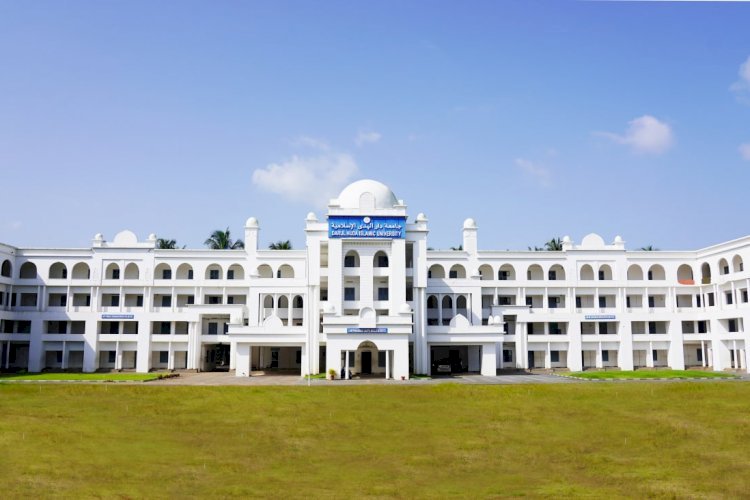
Darul Huda Islamic Univeristy, Chemmad, Malappuram, Kerala
Samastha National Educational Council (SNEC)
Under the auspices of SNEC, three distinct programs have been launched. The first, the "Sharee'a" Stream, seeks to nurture a community of Islamic scholars proficient in the principles and philosophies of Sharee’a alongside secular education. Secondly, the "SHE Stream" focuses on empowering women Islamic scholars through a comprehensive system of tharbiya and thazkiya education, supplemented by secular studies. Lastly, the “Life Stream” aims to develop a professional society grounded in spirituality, offering students the flexibility of multiple entry and exit points throughout their educational journey.

Concluding Remarks
It is worth noting that the educational revolution that began in Kerala is now extending its influence to other states of India through the Madrasa movement. Alumni of Darul Huda Islamic University, named HADIA, oversee 2512 madrasas across 12 states, providing structured Islamic education to 113,431 students. As Samasta commemorates its 100-year journey, its vision encompasses a nationwide revival in Islamic education.
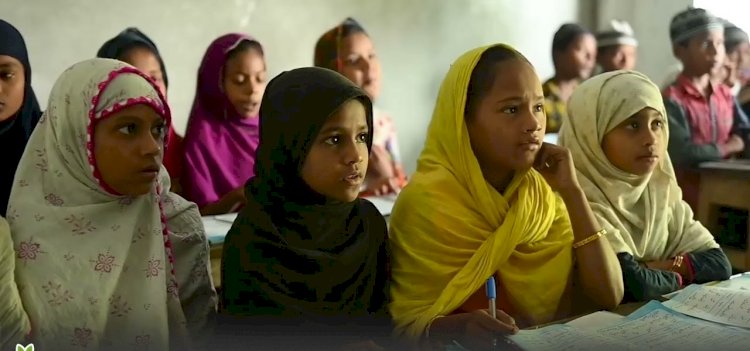
Students at Hadia Madrasah
About the author
Sayyed Mohamed Muhsin, PhD is Assistant Professor of Islamic jurisprudence at the International Islamic University Malaysia (IIUM), Kuala Lumpur. He also serves as Editor-in-Chief of Islamonweb-English (https://en.islamonweb.net/)
Disclaimer
The views expressed in this article are the author’s own and do not necessarily mirror Islamonweb’s editorial stance.
15 Comments
-

What a compelling reflection on the evolution of Islamic education in Kerala through six distinct phases—truly a testament to how tradition and adaptability have shaped community learning throughout the decades. The initiative by Samastha Kerala Jam’iyyathul Ulama—launching six impactful projects, including expanding higher education, coordinating nationally and internationally, and enriching socio-cultural educational systems—is both visionary and inspiring. Wikipedia As this legacy continues to unfold, it serves as a reminder of how important it is to nurture faith and scholarship from a tender age. For families inspired by this heritage, programs like <a href="https://meemacademia.com/register-now/">Quran learning for children</a> offer a meaningful way to begin building a strong spiritual and intellectual foundation in the next generation. May Allah bless these efforts and bring barakah to the future of Islamic education, both here in Kerala and beyond.
-

Online learning offers flexibility, allowing students to study at their own pace and schedule, making it ideal for balancing academics with other commitments. It provides access to a wide range of resources, from recorded lectures to e-books, enhancing learning efficiency. Additionally, online platforms often encourage self-discipline and time management, essential skills for academic success. For students looking to maximize their performance, combining online learning with effective study strategies can significantly improve grades. Overall, MeeM Academia makes learning more accessible, personalized, and convenient.
-

Mashā’Allāh, such a powerful reflection on Samastha’s 100-year legacy! The six-tier system truly shows the depth of Islamic education in Kerala. ???? At MeeM Academia, we’re inspired by this tradition and offer online Quran, Tajwīd, and Arabic programs that blend spiritual depth with accessible learning. Feel free to explore: www.meemacademia.com — we’d love to support learners continuing this rich legacy. ????
-

It’s inspiring to see how Samastha has shaped Islamic education over the past century, blending tradition with structured learning at every level. The impact on Kerala’s educational landscape is remarkable. At Meem Academia and Quran Tutor AI, we hope to complement such efforts by offering accessible, tech-supported Quran learning for today’s learners.
-

A fascinating look at the evolution of Islamic education in Kerala — from traditional Othupallis to digital madrasas. ???? Carrying this legacy forward, MeeM Academia is now offering online Madrasa programs, Tajweed classes, and Islamic courses using modern tools like AI — making it easier for students across Kerala and beyond to access authentic learning. Explore more: ???? www.meemacademia.com

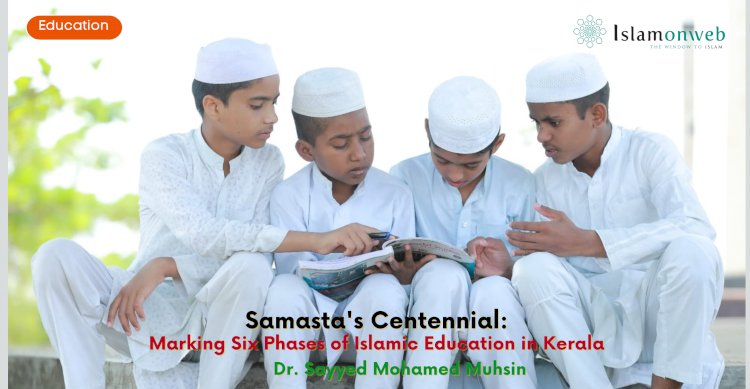


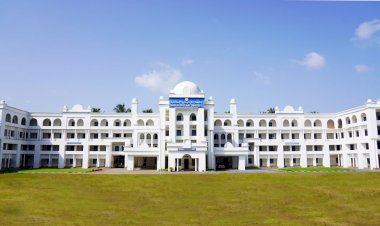
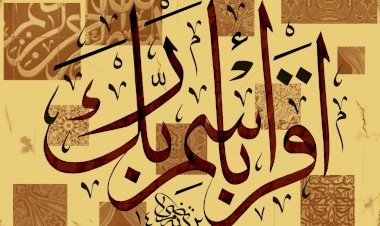
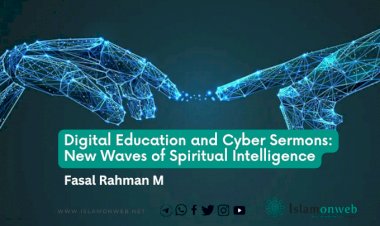
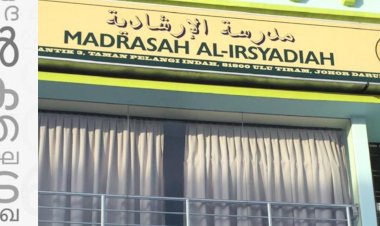
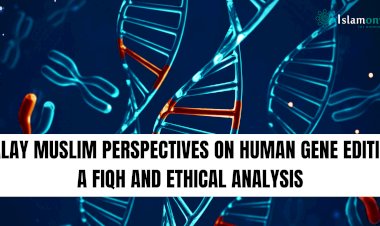
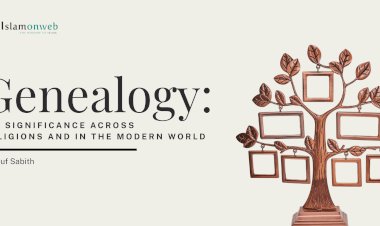














Leave A Comment